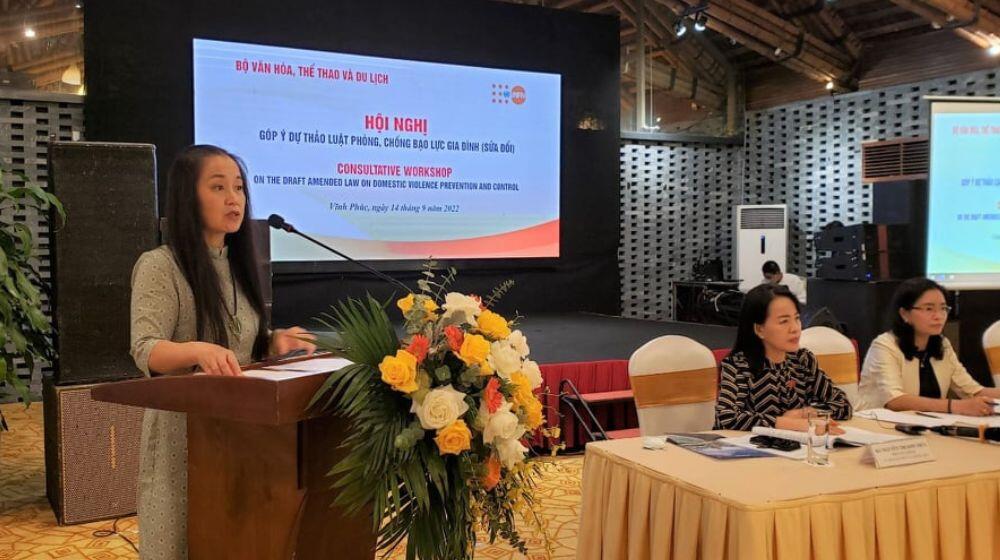Excellency Ms. Trinh Thi Thuy, Vice Minister of Culture, Sports and Tourism;
Excellency Ms. Nguyen Thi Kim Thuy, Vice Chairwoman, National Assembly Committee for Social Affairs;
Representatives from Peoples’ Committees, Peoples’ Councils, Provincial Departments of Culture, Sports and Tourism (DOCST) from northern provinces;
Members of the DVPC drafting committee and experts;
My UNFPA colleagues and media.
I am honored to join Mme Trinh Thi Thuy and Mme Nguyen Thi Kim Thuy today to chair the consultative workshop to discuss the draft amended Law on Domestic Violence Prevention and Control. This is an excellent opportunity for representatives from the Northern provinces to share their perspectives and experiences in addressing domestic violence, particularly violence against women, children, people with disabilities and the elderly. Your views and comments today are valuable because this important legislation, which is planned to be adopted in October by the National Assembly, must reflect the reality of addressing domestic violence.
The draft amended DVPC Law has gone through many technical meetings and consultative workshops with line ministries, experts in this field, and CSOs. The latest revised Law consists of 6 chapters, and 56 articles. The revised DVPC Law was elaborated by the National Assembly at its 3rd plenary session in late May and June. Now the revised Law is under review by the Ministry of Culture, Sports and Tourism and the NA Committee for Social Affairs. It will be reviewed one more time before the adoption by the National Assembly in October 2022.
May I take this opportunity to recall the fact that Viet Nam’s endorsement of the Domestic Violence Prevention and Control Law in 2007 showed the country’s strong commitment and remarkable efforts in addressing domestic violence. The Law has created a solid legal framework for the development as well as for the implementation of many policies and interventions in the last two decades.
In 2016, with technical support from UNFPA, the Ministry of Culture, Sports and Tourism conducted an independent review of the 10-year implementation of the 2007 Domestic Violence Prevention and Control Law. The review focused on the enforcement and involvement by relevant stakeholders, and the consistency of the law with international treaties and with other related laws and policies in Viet Nam. The review produced recommendations to revise the DVPC Law based on human rights and the survivor–centered approach, and to include other forms of violence against women and girls (VAWG) outside of the family setting, provide essential and integrated services including health, counselling, police protection, social and justice services, and transform awareness-raising communication campaigns towards actual behavior change of people. International lessons learned and good practices from countries such as Australia, Canada, EU, South Korea, and Spain have resulted in the consideration of advanced approaches in the revision of DVPC Law.
Dear participants,
The findings of the UNFPA-supported 2019 National Study on Violence against Women in Viet Nam showed that 62.9 percent of women in Vietnam experienced one or more forms of physical, sexual, emotional and economic violence, and controlling behaviors by their husband in their life time. Violence is hidden in Vietnam’s society, as 90.4 percent of survivors of violence did not seek any help from authorities. and half of them never told anyone about the violence. Furthermore, violence against women is costing the country 1.81% of GDP. And this is an alarming issue. It’s high time to review and amend the existing national policies and relevant laws, including the Domestic Violence Prevention and Control Law, to ensure its compliance with international obligations and standards.
Over the years, UNFPA has been working closely with the Ministry of Culture, Sports and Tourism for the revision of the Law to incorporate all recommendations from previous studies and ensure international standard and commitments on the prevention and response to domestic violence. I would like to congratulate the MoCST and the National Assembly for making the revision process so comprehensive, consultative and participatory. UNFPA is honored to have accompanied this process, which has been truly exemplary.
There is no Bible Law on the prevention and control of Domestic Violence. The onus is on us, to produce the final draft as an outcome document of many consultations undertaken so far, and to make it work for the prevention and effective response to domestic violence. I trust that together, we can eliminate domestic violence in Viet Nam, which is essential to achieve SDGs by 2030.
Thank you very much for your attention!


